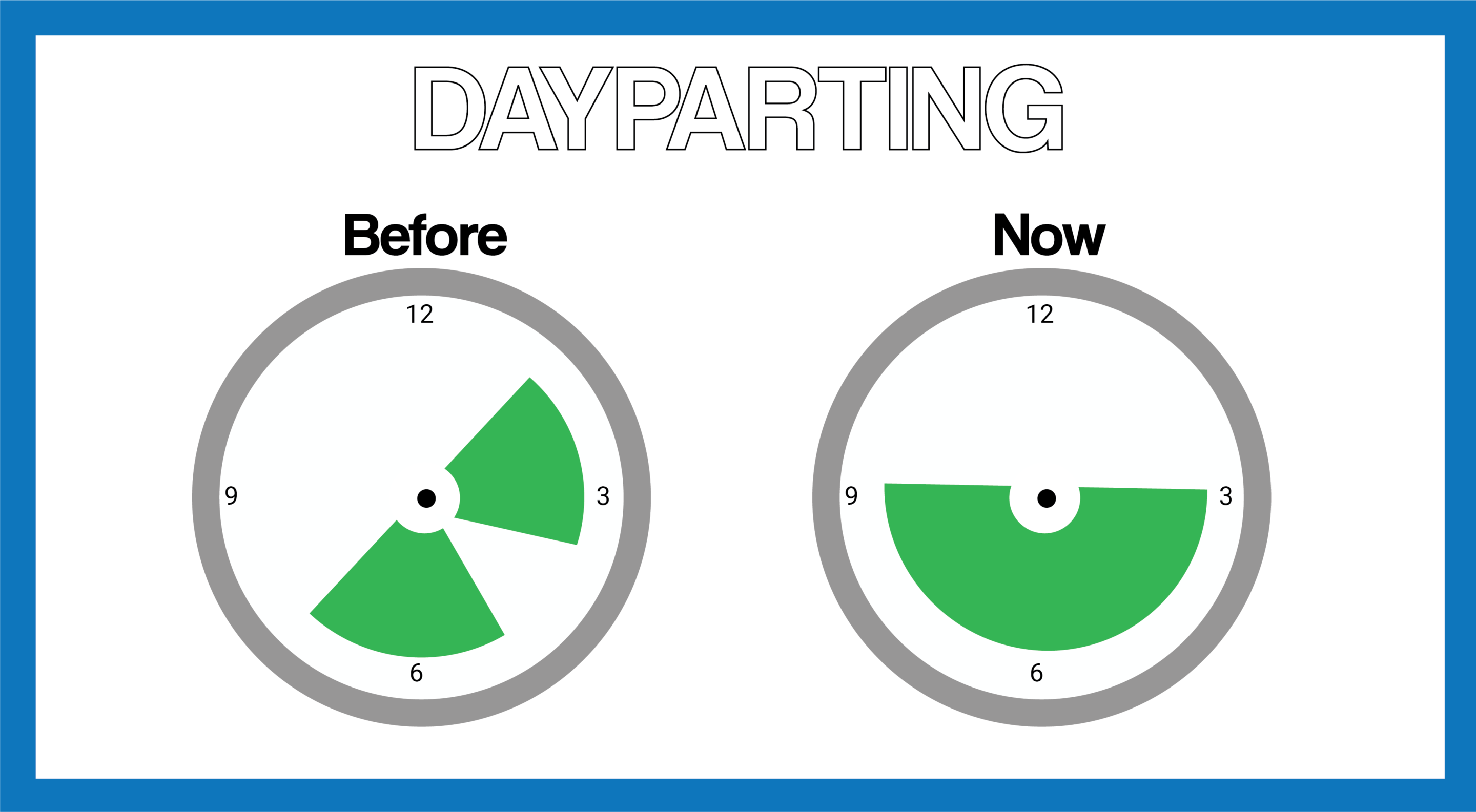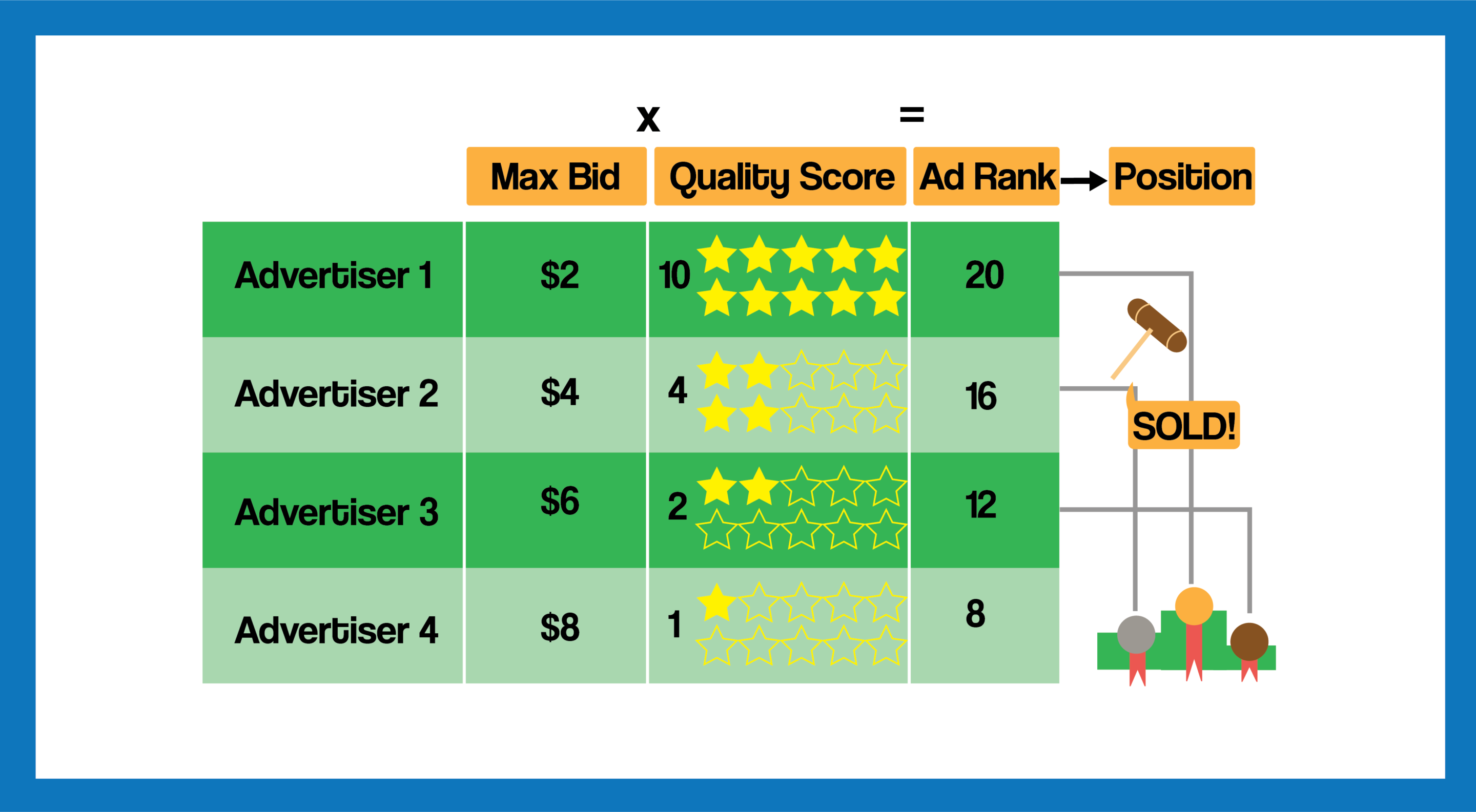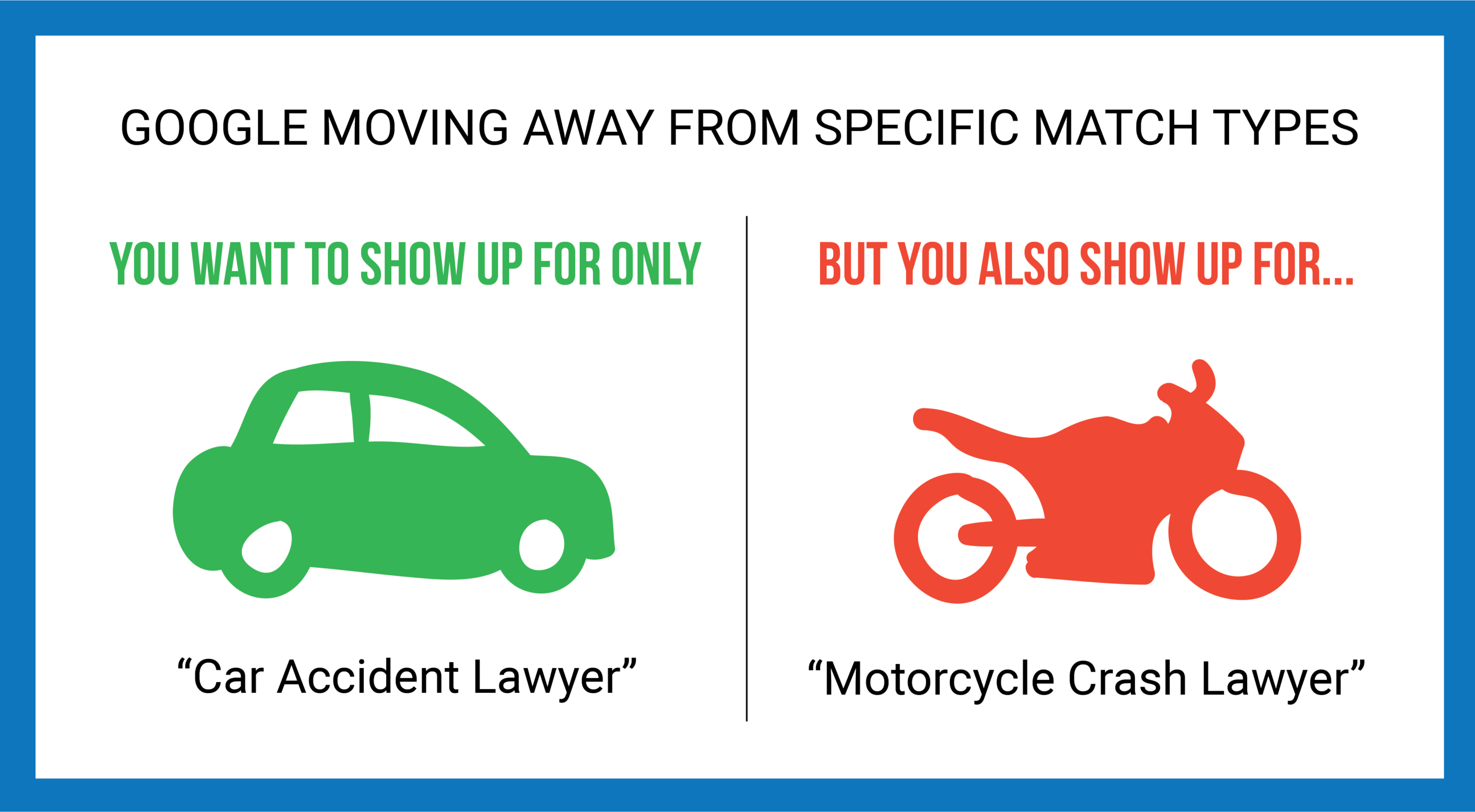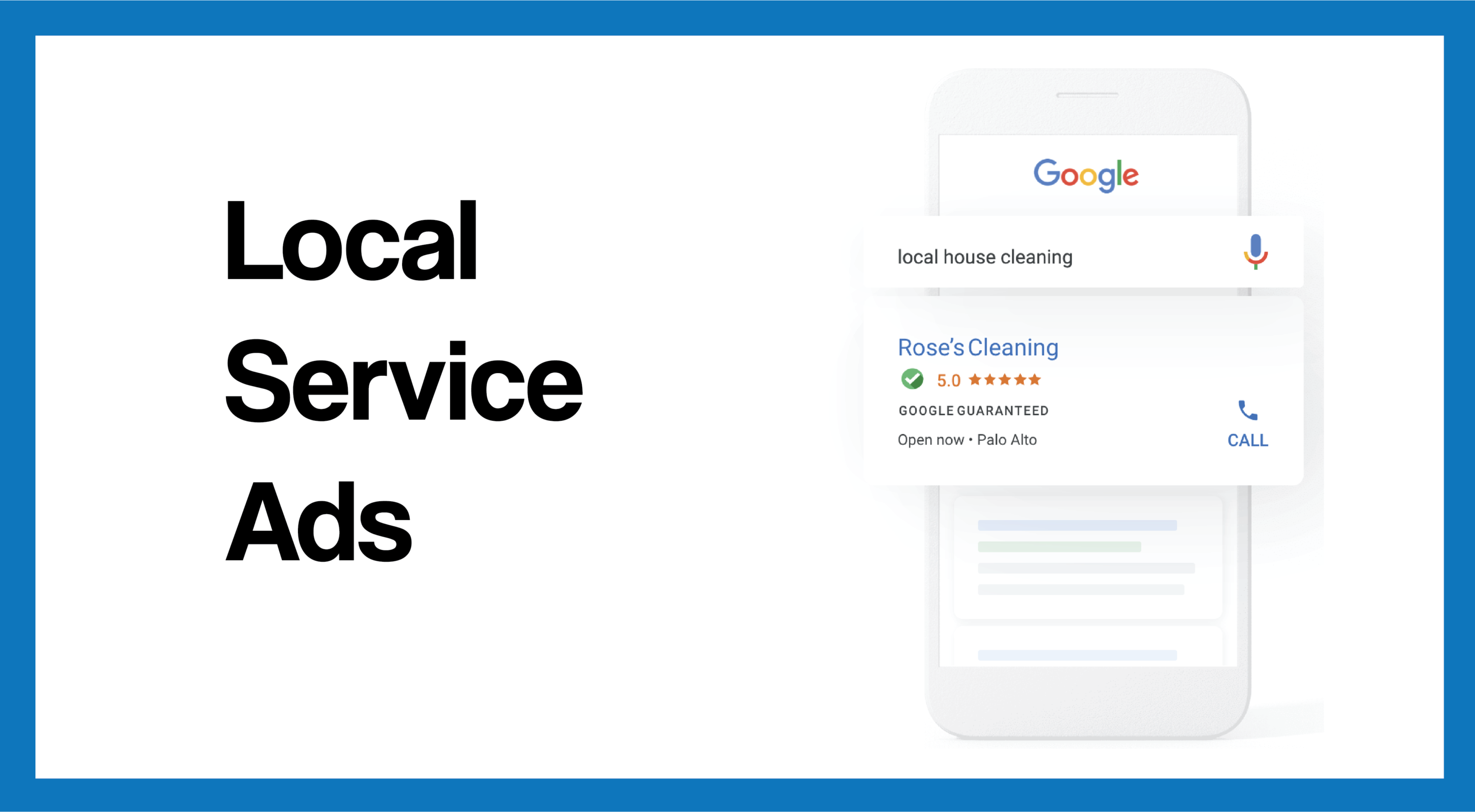It’s 2019 and automation is the big buzz word.
No shocker there.
However, Google is making a tremendous number of changes to their Google Ads platform, showing signs that they are moving further and further towards automation and machine intelligence.
Essentially, they want to make it so that your law firm’s PPC campaigns can be “set it and forget it”.
They’re trying to make Google Ads an easy and seamless platform to use for all (not just experienced marketers).
However, as you know in running a law firm: it’s not that easy! You wouldn’t expect me (an experienced digital marketer) to defend your clients in court, would you? So, why would Google (or anyone for that matter) expect a legal professional like yourself to understand the ins and outs of setting up law firm PPC campaigns that work.
Legal is the most competitive niche for Google Ads, by far. There are no other niches with thousand-dollar clicks going around, and every wasted click is money down the drain.
We want to make sure that you keep control of your law firm’s PPC campaign, so that you can pull in more cases, waste less money, and have more control over the quality of cases that are coming in.
If that’s what you want for your firm, keep reading for more information about these recent changes, and how you can take advantage of them.
Change 1: Goodbye Accelerated Bids, Hello Standard Bids
Google is sunsetting Accelerated Bidding on their advertising platform.
Accelerated Bidding: In the past, you were able to set your daily spend limit and Google would automatically start showing your ads until you hit your daily spend. After your daily spend was hit, your ads would be shut off for the day.
This helped drive conversions and ensured that your ads were served (shown) as many times per day as possible.
However, Google announced that they are doing away with this feature come October 1st, 2019.
So, what does this mean for your law firm’s PPC campaigns?
Google is shifting to Standard Delivery.
Standard Delivery: Aims to distribute your daily ad spend evenly throughout the course of one day.
This means that even if you turn on your ads, and you want them to specifically run during the morning, and you don’t care about missing out on potential leads or clients later in the day, you’re able to specifically maximize your budget.
The search engine giant believes that their machine learning and algorithms have improved enough to keep CPC (Cost Per Click) down, while still delivering the same number of conversions.
How To Prepare For This Change: Time will tell just how good Google’s algorithm’s truly are. But in order to prepare for this change, you must ensure that the keywords you are bidding on make sense for your law firm. You don’t want to spend money on clicks from people who will never become clients of your law firm.
Change 2: Removing Hour By Hour Dayparting

Dayparting is an optimization tactic that allows you to show your ads ONLY during specific times of day.
Let’s say, for instance, that you’re a divorce attorney and you know that most of your clients and phone calls from potential leads come in after work hours.
Ideally, you’d only want to show your ads from 4 PM on – ensuring that you’re showing up in-front of potential clients who actually have time to speak on the phone now.
Well, that specific type of dayparting is going away.
Now, you’re only able to daypart in three-hour blocks.
This means that you’re only able to ensure that your ads show up from 3 PM – 6 PM.
Why does this matter?
It gives the advertiser less control over the granular details of your law firm’s PPC campaign that can make all of the difference.
How To Prepare For This Change: Go through your campaigns (or ask your marketers) and audit when you currently have your dayparting set up for. Ensure that these new 3-Hour time blocks are exactly what you want.
Change 3: Removing Average Positions

Image adapted from: Wordstream
In August, Google Ads announced that they were removing average position.
When advertising on Google – you’re essentially competing in an auction against your local competitors.
For instance, 4 divorce lawyers in Chicago could all be bidding on the same keywords.
So, who’s ad gets to show up first?
That all depends on your Ad Rank – a number based on your bid and quality score.
This determines your Ad Position – where you show up on the page: 1st, 2nd, 3rd, or bottom of the page.
So, this may seem like an important factor in the success of your law firm’s PPC campaigns, right?
Wrong (well at least Google thinks so).
They’re now rolling out a new set of metrics that give you insight as to how your ad is performing in Google’s Ad Auction.
Google’s new Ad Position rankings are: Top Impression Rate, Absolute Top Impression Rate, Top Impression Share, Absolute Top Impression Share.
Google believe’s that these new metrics give you a much “clearer view of your prominence on the page than average position does”.
How To Prepare For This Change: Familiarize yourself with Google’s new metrics as this will become the new alternative to average position.
Change 4: Moving Away From Specific Match Types

Google is now allowing ads to be served for quieries that IT BELIEVES is related to your broad modified and phrase match keywords.
Let’s say that you are a car accident lawyer and you’re running an ad for the keyword “Car Accident Lawyer” – you only want to show up for car accidents, and no other MVA’s.
Well, with this latest change Google may show your ad to someone who types in, “Motorcycle Accident Lawyer”.
This change really only impacts law firms with smaller marketing budgets.
For those with larger marketing budgets, who can afford to spend money on clicks that may not be ideal, it doesn’t matter much.
With exact match keywords, you could bid on specific keywords, like “car crash lawyer,” with an exact match type. Your ads would only show up if someone typed in those exact words.
This is not the case anymore.
Now, if you bid on those same keywords with exact match, your ads might also show up for “motorcycle crash lawyer” and other close variants to the word “car”.
This could cause problems. Someone who’s looking for a motorcycle accident lawyer is probably not going to click on an ad that specifies car accident lawyer.
Don’t worry though, there is a way to solve this, with a heavier push towards your negative keywords strategy.
How To Prepare For This Change: Be sure to include negative keywords in your law firm’s PPC campaign. This will ensure that you never show up for unwanted searches. In the example we shared above, you would want to exclude out “motorcycle” and “motoercycle crash” so that you avoid paying for clicks on cases that you do not want.
Change 5: Introduction Of Local Service Ads

In 2019, Google introduce Local Services Ads (LSA’s for short).
This new type of ad is great for local advertisers to have another chance at someone clicking on their ad.
So, who do Local Service Ads work for?
Well, they aren’t rolled out in every market as of now. But, if Google is testing a Beta version of LSA’s in your market, they’re great for local companies such as law firms.
One thing to know is that LSA’s are lead generation ads, and you only pay per lead… Not click.
Local Service Ads are still only being tested in certain areas, but they are coming, and this is going to be a huge disrupter in how lawyers generate business.
How To Prepare For This Change: First, find out if LSA’s are being tested in your local market. If they are, ask your marketers to run a campaign for you. You should go into this understanding that this is a test – just like any new feature of any advertising platform. We recommend starting with a small budget, and scaling upwards.
Change 6: Introduction of Smart Campaigns for Google Ads
As we mentioned earlier in this blog post, Google is moving closer towards automation and machine intelligence.
They believe that the machines they have created are smarter than people. Only time will tell. However, there are certain intuitive testing and optimizations that can only be perfomed by a live human.
Google’s introduction of Smart Campaigns is a step towards a more automated advertising world.
So, what exactly is a Smart Campaign?
It’s the opposite of manual bidding – the lowest level of control that you have over your Google Ads campaigns for your law firm.
Instead of going into a campaign and setting your Ad Spend per click or lead, Smart Bidding opens your campaign up to whatever the auction has to offer.
Why is this dangerous?
Because – regardless of what they say – Google has no way of knowing what an estate planning lawyer should be, or shouldn’t be willing to pay for a lead versus a personal injury lawyer, criminal defense lawyer or divorce lawyer.
How To Prepare For This Change: Ensure that your negative keywords are properly set up in each and every one of your campaigns. As Google moves closer towards automation, you want to make your restrictions as tight as possible so that you avoid paying for cases and clicks that aren’t worth your time or money.
Conclusion: How Will These Changes Affect The Legal Marketing Industry?
The bottom line is, if you’re not smart, it’s going to cost you more money to generate quality cases from search engines.
Google will continue to take back control and remove manual steps from their processes so that in the end they can command the price, not you.
However, there are ways that you can take back control over your law firm’s PPC campagins.
Ensure that you’re using the right negative keywords in your campaigns, tailor your campaigns to show up for very specific long-tailed keywords that are less competitive and have a lower CPC.
In 2019, and the years beyond – being proactive in order to succeed with Google Ads for your law firm is the name of the game.